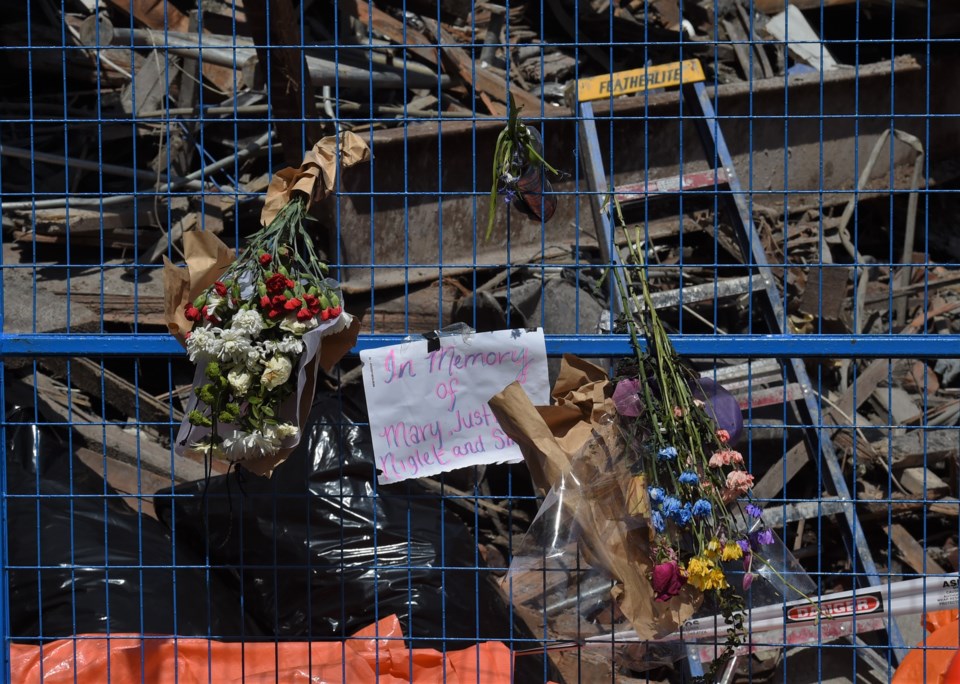The five-person jury in the Winters Hotel coroner’s inquest returned late Monday afternoon, to deliver 25 recommendations in the hope of making single-room occupancy hotels safer for vulnerable tenants.
But will they be adopted?
The recommendations are non-binding, but will be forwarded to Chief Coroner Lisa Lapointe, who may bring them to the attention of the appropriate agency or ministry.
Presiding coroner John Knox and the jury heard testimony from 29 witnesses over nine days in Burnaby coroner’s court. Deliberations began Friday. They were examining the April 11, 2022 deaths of tenants Mary Ann Garlow, 63, and Dennis James Guay, 53, in the decaying Gastown heritage building where fire sprinklers were not working at the time of the fire, which started due to an errant candle.
The jury classified both deaths accidental, from thermal injuries and smoke inhalation as a consequence of a residential fire.
Recommendations were read aloud by a jury foreman, whose name was not publicly disclosed, and directed to BC Housing, the Minister of Housing, Minister of Public Safety and Solicitor General, Vancouver Coastal Health, City of Vancouver, Vancouver Fire and Rescue Services and the Vancouver Police Department.
The jury recommended that BC Housing upgrade fire safety equipment, plans and training for staff and tenants, hold SRO operators to a higher standard under their lease agreements and maintain an inventory of backup fire extinguishers. It suggested there be one backup fire extinguisher for every two required under the Fire Code.
“The jury heard evidence from several witnesses that smoke alarms and fire safety equipment in SRO buildings were damaged, removed or not operating,” the foreman said. “We also heard evidence from several witnesses that there was no specialized fire safety equipment for tenants with disabilities. The jury heard evidence that tenants with disabilities did not have evacuation plans in place. The jury also heard evidence that staff did not receive fire safety training.”
The jury recommended SROs be purpose-built and meet modern building codes and safety standards. All properties should be inspected and cleared for occupancy prior to tenant move-in. It said BC Housing should phase-out or eliminate SROs operating in privately owned buildings.
The jury recommended better information-sharing among agencies, including creation of a database that lists all SROs, city shelters and transition houses, containing a history of municipal bylaw violations, fire watch orders and occupants with disabilities.
“The jury heard evidence fire crews were not fully aware of the [Winters Hotel],” the foreman said.
There should also be a mechanism for tenant complaints, with a dedicated phone line staffed by a tenant ombudsperson to oversee, investigate and followup complaints. Tenants should be provided pamphlets and posters so they know how to contact the ombudsperson.
“The jury heard evidence that not all tenant complaints received a response.”
There should be more inspections and a critical incident team ready to assist around the clock, including social workers and mental health support workers. Municipalities should strengthen their building bylaws and step-up fire safety enforcement, including fines and prosecution for building owners who flout bylaws and notices.
“The jury heard evidence that fire crews were delayed on calls at SROs and therefore out of service for actual fire calls while dealing with non-fire mental health and addictions incidents.”
To the solicitor general, the jury recommended legal amendments gathering dust be brought into force without delay, to provide opportunities for additional enforcement.
“The jury heard evidence that the Fire Safety Act 2016 has been approved but not implemented. The jury heard that the notice of violations were routinely ignored and tenants weren't notified.”
The jury also recommended the minster of housing convene an annual summit of social housing stakeholders to exchange information on best practices for fire safety and critical incident repose. It also wants the minster to create a combined task force working group to identify land that could be developed for social housing and shelters.



